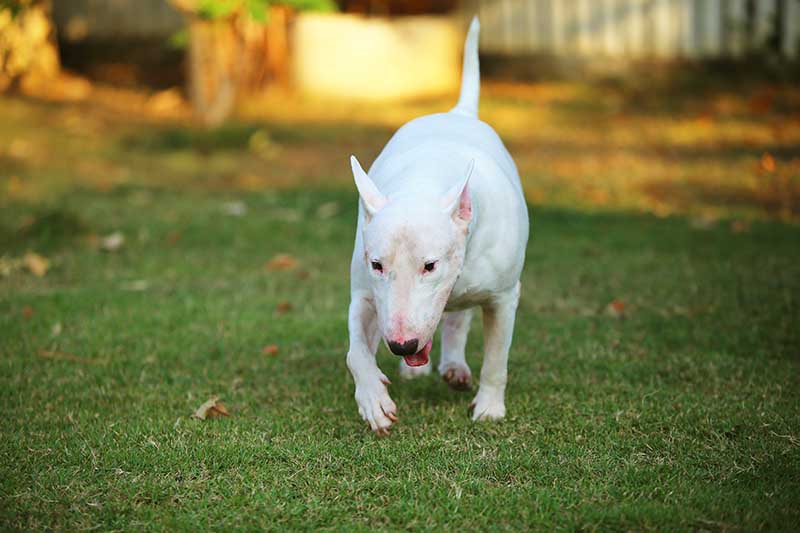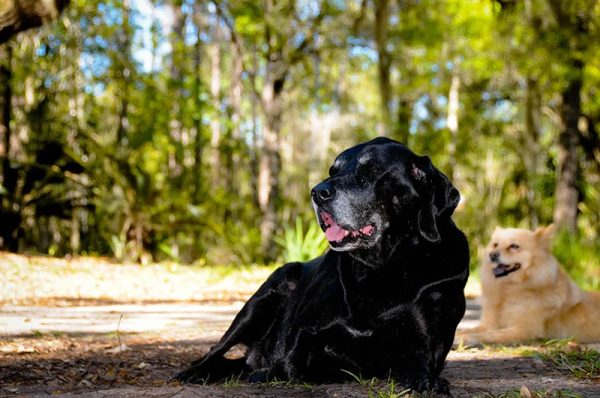In this article
Bull Terriers were bred for pit fighting. These dogs are rough and ready to rumble. However, they also have a sweet, tender side. Loyal, happy to follow commands, and energetic, Bull Terriers like to spend time with their favorite humans. So, for an active family looking for a playful pet, they are a near-perfect pick. But what about life expectancy?
The average Bull Terrier’s lifespan ranges from 11 to 14 years. Now, Bull Terriers are athletic, well-built, and healthy. That said, dog parents can still have a huge impact on the pet’s health by feeding it the right food, taking care of its coat, and never missing an appointment with the vet. Read on to learn more!

Bull Terrier Average Lifespan
An active, well-fed Bull Terrier with good genes can live for up to 14 years. According to the AKC, the life expectancy for most medium-sized dogs is 10–13 years1. So, that puts Bull Terriers slightly above the average for their weight category. Bull Terriers do suffer from various health conditions, however, including kidney failure caused by hereditary nephritis. Signs include a bad appetite (yet high thirst) and frequent urination.
It’s a very aggressive disease that can steal several years from a Bull Terrier’s life. And, unfortunately, it’s almost impossible to heal from it, especially if the docs fail at diagnosing it at an early stage. That’s why it’s recommended to adopt a Bull Terrier from a reputable breeder and make sure the pup has healthy kidneys. Otherwise, it might be too late to treat it!
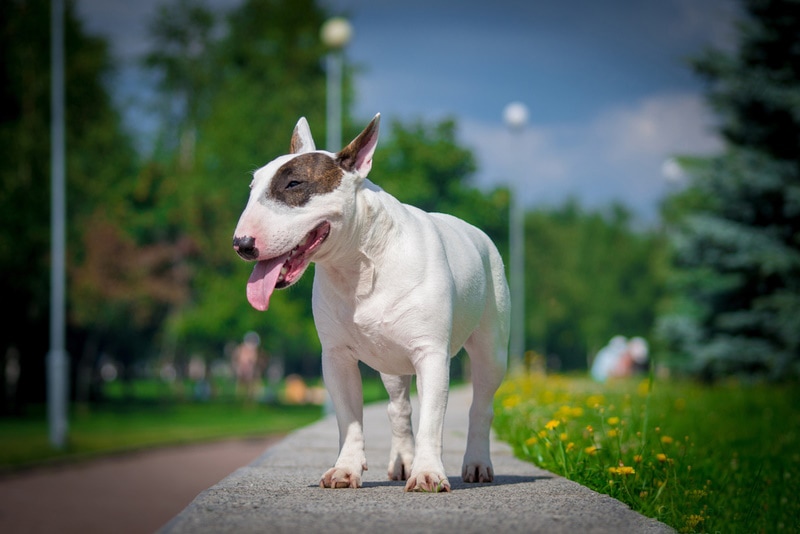

How to Care for Your Bull Terrier for a Long Lifespan?
Feeding/Diet Recommendations
Start by feeding the dog premium-quality food with no fillers or mediocre ingredients. Consult a vet to learn about the perfect balance of carbs, protein, and fats for your furry friend’s muscle and brain development. The lack of necessary nutrients might lead to stalled growth and various medical issues.
But if you feed it too much food, that will result in obesity. To aid the dog’s metabolism, break down the diet into several smaller meals. Also, Bull Terriers are highly energetic canines: they need a bit more calories than the average dog. However, once the dog becomes less active with age, you’ll need to lower its daily calorie intake.
If you would like to learn more about the specific nutritional needs of your Bull Terrier, we suggest you speak to a vet to identify the best options and food portions for your pup.
If you need to speak with a vet but can't get to one, head over to PangoVet. It's our online service where you can talk to a vet online and get the advice you need for your dog — all at an affordable price!

The Environment/Socialization
Another factor that can increase or decrease the Bull Terrier life span is the environment. Now, Bull Terriers aren’t well-suited for below-average temps. The fur is rather short and fails at protecting the pet from chilly weather, although it does enjoy cool temps. So, consider buying a cute sweater for your four-legged friend. Overheating can be an issue as well.
Thus, it would be best to only take the dog outside when the sun isn’t up yet. And one more thing: to make the Bull Terriers feel safe and stress-free in crowded places, socialize the dog while it’s still a pup. This way, it won’t get anxious when meeting other pets or humans. Bull Terriers aren’t very friendly toward other dogs, though—keep that in mind.
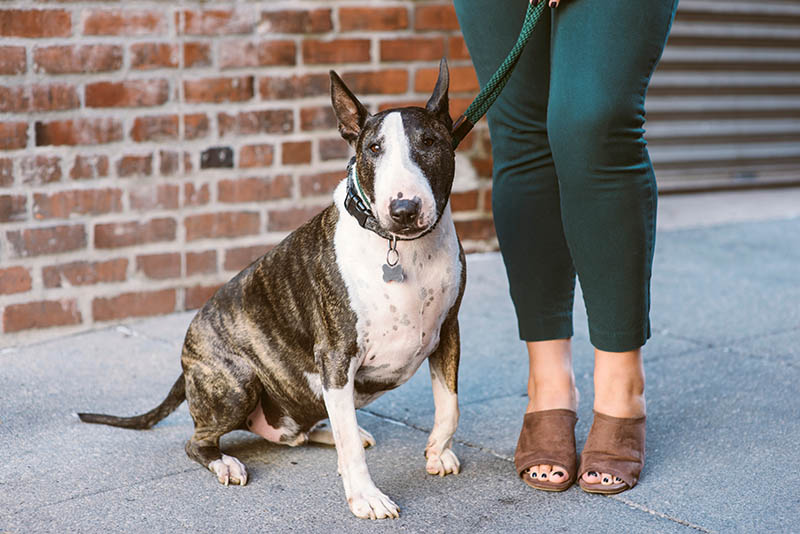
Exercises/House Size
Bull Terriers are quick to adapt to new conditions, yet they don’t feel great in tiny apartments. Ideally, you should only adopt this doggo if you own private property with a backyard. The lack of activity will quickly lead to boredom, anxiety, destructive behavior, and obesity. On average, Bull Terriers need 1–2 hours of exercise daily to stay in shape.
Grooming/Cleaning
Bull Terriers have short coats, so weekly brushing is enough to maintain it. More importantly, clean the dog’s ears regularly to prevent bacteria and infections. The nails should be trimmed regularly as well. Otherwise, it will hurt the dog to walk, let alone run. Or worse—the pooch might trip and fall and get injured!
Hereditary/Other Conditions
Before you commit to a Bull Terrier, see that it doesn’t have any chronic conditions. Kidney issues, heart diseases, deafness, and dysplasia are the most common and hard-to-treat issues for Bull Terriers. So, ask the breeder to show proof that the pups were tested thoroughly. We would also recommend avoiding inbred Bull Terriers.
Healthcare/Sterilization
To keep tabs on the pet’s health, make regular visits to an animal clinic. The veterinarians will tell you about potential health issues or conditions that can be treated with meds, supplements, a diet change, or surgery. The sooner they catch it, the easier it will be to get the fur baby back on its feet. Also, do consider neutering or spaying the dog. Studies have shown that sterilization lowers the risk of various diseases.
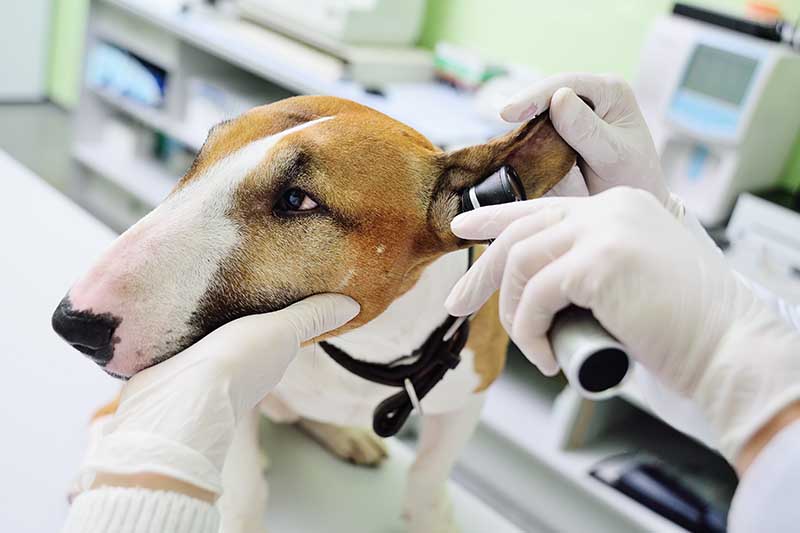

The Life Stages of a Bull Terrier
Just like any other dog, Bull Terriers go through four different life stages, including:
Puppyhood
On average, this stage lasts for 12–18 months. Puppy food that’s rich in proteins, fats, minerals, and vitamins will ensure steady growth. And to stay fit, make sure the doggo gets enough exercise (at least 1–1.5 hours) to keep its muscles, joints, and mind active. And don’t forget to socialize it every chance you get!
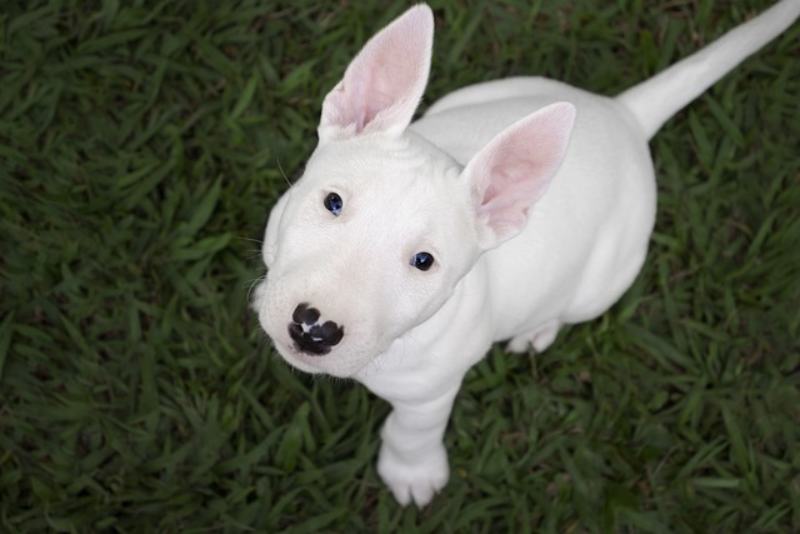
Adolescent
Two-year-old dogs are considered mature canines. So, before the pup makes it to 24 months, it will be a young adult. But the pet won’t do much growing—just an inch or pound or so. The recommendations for training and feeding are mostly the same. An adolescent Bull Terrier might need a slight diet change, though.
Mature Adult
Bull Terriers stay the same once they hit maturity. At this stage, you should switch to a diet with an adult formula. Fully grown Bull Terriers are incredibly strong, agile, and energetic and can easily handle up to two hours of exercise. Not much will change in terms of the dog’s personality, though: it will be as playful as ever!
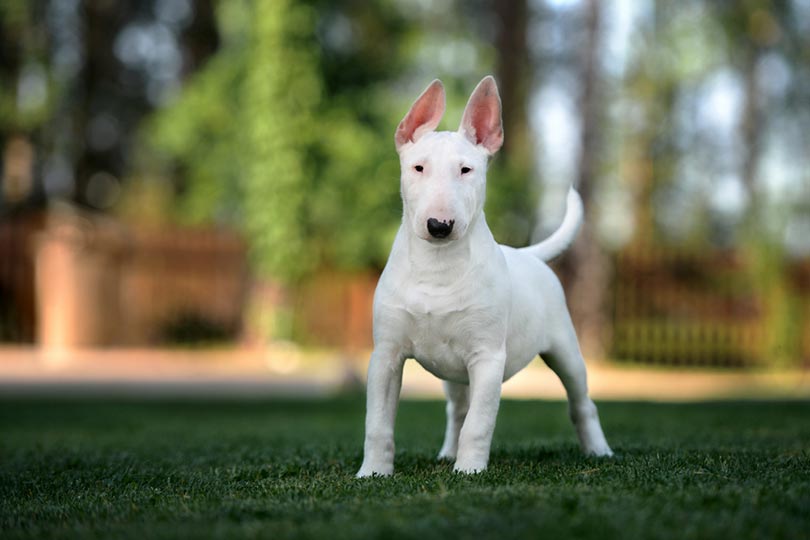
Senior Dog
Yes, Bull Terriers do get old, and the first signs appear when they turn 7–8 years old. You’ll notice that the dog is slightly less active than it used to be and prefers to spend more time getting comfy on the couch. Talk to an animal doctor about its diet: it might be time to switch to senior-dog food.

How to Tell Your Bull Terrier Age
The most obvious thing to check first would, of course, be the dog’s size. Adult Bull Terriers reach 22 inches in height and weigh 50–70 pounds. So, if your four-legged bud is nowhere close to that, then it’s probably still 1–2 years old. To get a more specific read on the pet’s age, look at the fur. Older Bull Terriers have slightly faded hair; the same goes for the whiskers. A gray muzzle equals an older canine.
And what about the teeth: are they white and bright, or a little bit faded as well? If they lost that “sparkle”, that means the doggo is an adult. This is true even if you keep up with the dog’s hygiene routine. Also, adult teeth only grow once the pup turns six months old. Lastly, the eyes of a senior dog are a bit cloudy, while the paw pads are darker.
Why Does Age Matter?
Knowing your dog’s exact age helps you take better care of it. For example, puppies rely on protein- and calorie-rich food to grow. Older dogs, in turn, don’t like dry food that much because it’s harder to digest. The exercise intensity differs as well: senior dogs need less activity. As for healthcare, different age groups face different medical issues.
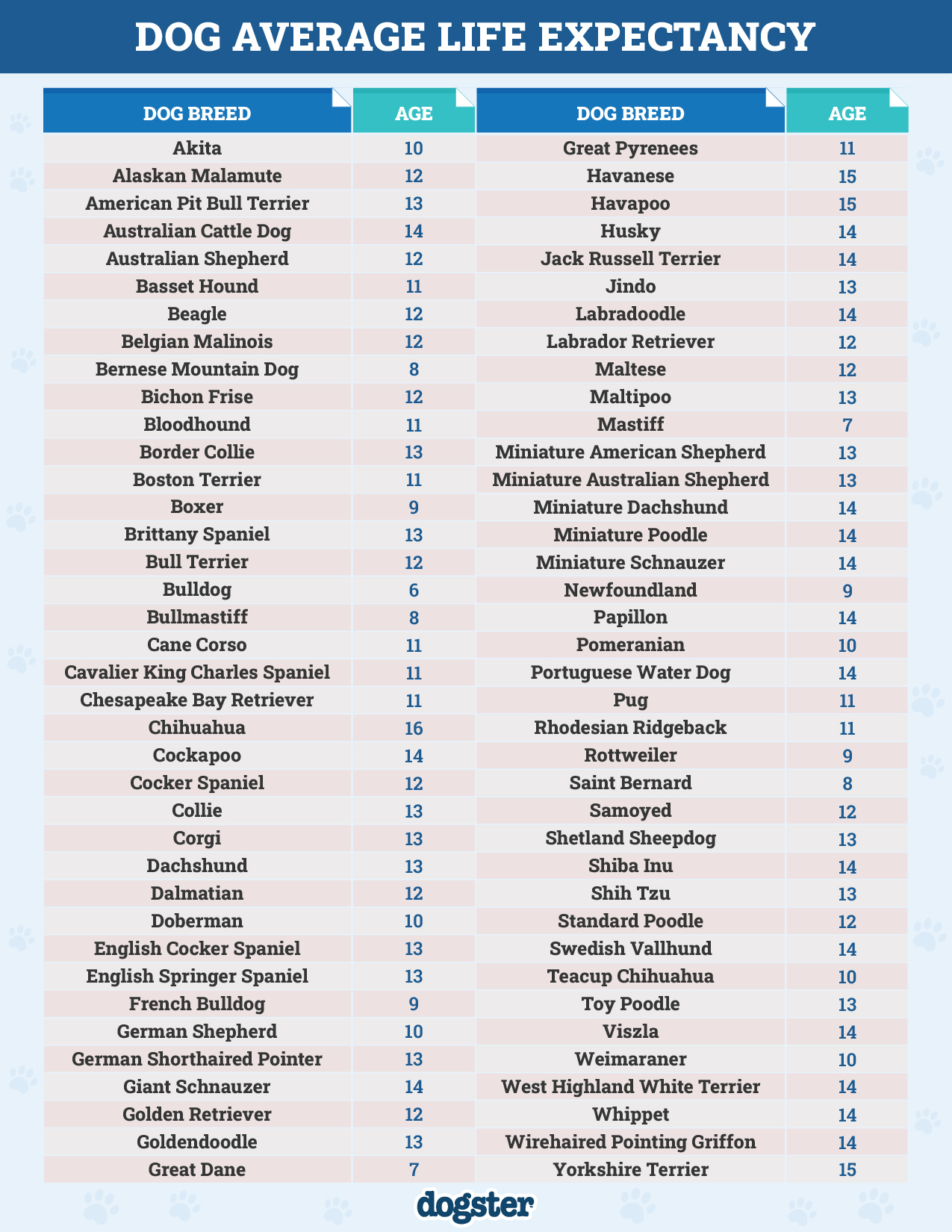

Conclusion
Bull Terriers are lean, muscular dogs with stamina for days and the attitude of a “go-getter”. With that, they’re also quirky, affectionate, and love nothing more than playing games and exercising with their human parents. Also, while they are, sadly, prone to various medical conditions, when maintained properly, Bull Terriers live long, healthy, and happy lives.
Early socialization, the right diet, and high-intensity exercises (physical and mental) will greatly increase the dog’s chances of living for 11–14 years. That’s quite a good lifespan for most canines! So, follow the simple yet important rules from our guide, have the pet checked by a vet once or twice a year, and keep the furry bud in tip-top shape!
Featured Image Credit: Wasitt Hemwarapornchai, Shutterstock
